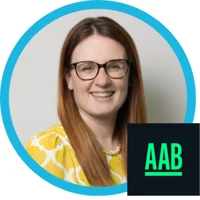Here’s why 10-15% of your work could be set to disappear
Finance teams and accountants could see up to 15% of their more routine work disappear in the not-too-distant future.
That’s among the opinions shared by Lauren McIlroy, who heads the Virtual Finance Function at the leading accountancy and business advisory firm AAB, in a new guide published by iplicit.
Lauren recently joined a webinar called Building the Finance Function of the Future, along with senior figures from iplicit and the accounts payable automation platform Lightyear.

How AI could change the work of the finance team
Whether you’re an enthusiast or sick of hearing the term, artificial intelligence is the subject you can’t avoid at the moment.
Lauren believes ignoring AI means ignoring something that could have a profound effect on the careers of anyone in finance.
“I heard Steven Bartlett, the author and presenter of the podcast The Diary of a CEO, speak recently,” she says.
“He said if there’s something that’s making you really uncomfortable, it’s likely that this will be the thing that cuts through and makes a difference – and he’s right. AI is making us all quite uncomfortable and we have to lean into that discomfort and embrace it, because there’s a massive change coming.
“We’re not quite there yet, but I do think that bottom 10-15% of transactional work will all of a sudden just be done and we won’t need to check it. We won’t need the human element.”
Getting better at integrations
Among the subjects discussed in the webinar were integrations between finance software and other business systems.
Many businesses have used entry-level finance systems and integrated them with applications for doing other tasks. This can come with risks if the “stack” of connected apps becomes too complex.
 Lauren says organisations have traditionally bolted other applications onto their finance software because they didn’t want the disruption of changing systems. “If you ever suggested to the finance team that you wanted to change their system, that was met with a lot of sighs and groans. And that’s because the implementation stage has always been difficult,” she says.
Lauren says organisations have traditionally bolted other applications onto their finance software because they didn’t want the disruption of changing systems. “If you ever suggested to the finance team that you wanted to change their system, that was met with a lot of sighs and groans. And that’s because the implementation stage has always been difficult,” she says.
“But failed integrations are even worse because you’ve got a huge number of people, all of whom were kind of happy with their system before, and who are now all very unhappy. We’ve seen that a number of times with our clients unable to get numbers, unable to get reporting into the business and to the investors and that just doesn’t work.
“If we choose Xero as an example, people try and use Xero for things it’s just not designed for and you end up with Xero plus 18 different apps. That just doesn’t work, and actually having an integrated system in the first place would be much easier, yet people have shied away from that because they thought it would be too expensive.”
What tech will mean for recruitment
In iplicit’s publication Change Is Coming: 7 Key Trends in Finance Software You Need to Know About, Lauren has also discussed the impact tech could have on recruitment, for finance directors and accountants alike.
“The questions job candidates ask at interview are completely different from what I would have asked when I was first hired,” she says.
“Tech and ESG are probably the two main elements that people are focused on.
“The recruitment market is unbelievably competitive. People are saying ‘I don’t want to work that many hours, I want to work flexibly, I want to balance my life’ and firms are having to pay higher salaries for less qualified people.
“But candidates do want to be challenged and they want to embrace tech. Employers need tech strategies. How are they going to train people? What AI projects can those people work on?
“Being forward-fitted with tech actually suggests that you’re forward-fitted with the rest of their employment and can support them as they grow as they move through their careers.”
The challenge, she says, could be making sure new recruits have an understanding of the traditional principles on which accounting software builds.
“It’s great for our graduates and trainees to have access to these systems, but they still have to understand the basic accounting. If you don’t, you’ll struggle as you get up the chain, to advise on anything,” she says.
“If you don’t understand how a sub-ledger’s built, you won’t understand how to do a P&L analysis and what’s wrong with it, what’s happened this month and whether there’s going to be a cash flow issue or a working capital issue. Once you’ve got that basic understanding, you can let the system do everything for you, but you have to learn.”


 (+ 353) 1 592 0850
(+ 353) 1 592 0850 (+ 44) 20 7729 3260
(+ 44) 20 7729 3260
